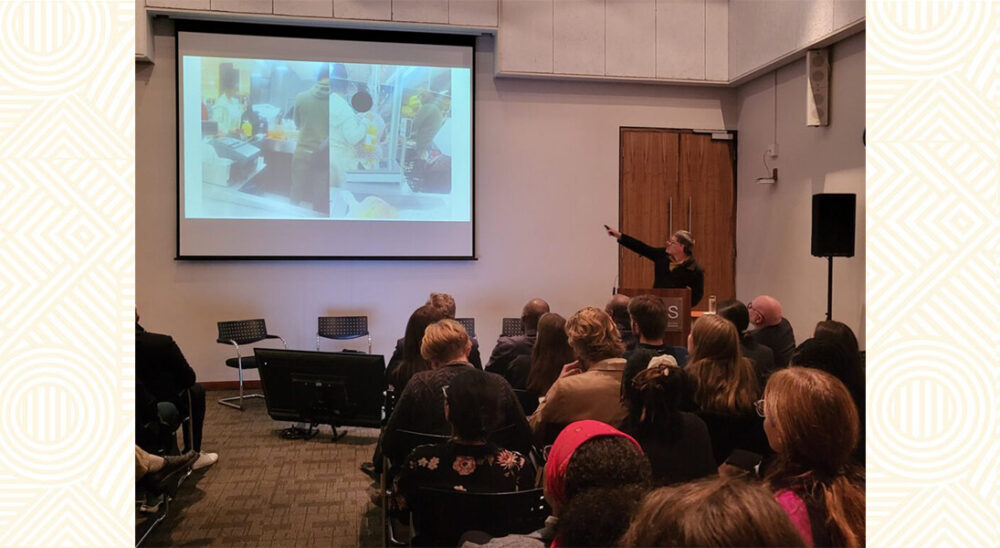
[Article by: Fumanim]
“Extraordinary claims require extraordinary evidence.”
So said Nathan Geffen (pictured), editor of GroundUp, about the reporting approach his news agency followed when they started investigating the prison escape of the infamous Thabo Bester.
Geffen was the keynote speaker at the Department of Journalism’s annual Press Freedom Day celebration on Wednesday 3 May. This year’s event titled “Outposts in news deserts” focused on local and community media perspectives through panel discussions and practical workshops.
In his presentation, Geffen explained the meticulous fact-checking that their articles on Bester underwent. “Using an evidence-based approach, journalists can ensure that they are better, more accurate and more relevant than social media,” said Geffen.
In opening the day’s events, held at the Stellenbosch Institute for Advanced Study (STIAS), Prof Herman Wasserman, chair of the Department of Journalism, said that our democracy is a “lively and noisy one” thanks to the role that the civil society and the media have played to keep power to account. Yet, cautioned Wasserman, while freedom of expression is guaranteed in our Constitution, there are increasing threats such as harassment and threats to journalists, as well as the rise of disinformation, that endanger these freedoms.
In keeping with the theme of the day, Prof Anthony Leysens, Dean of the Faculty and Arts and Social Sciences, told the audience that we should celebrate the examples of excellent local journalism that are “informed, engaged and connected” to the challenges faced by their communities.
The full-day event was attended by representatives from the media industry, academics, and journalism students. The morning panels focused on the value and sustainability of local news, and the importance of academic research in this field. In the afternoon, expert practitioners conducted workshops in fact-checking and accountability journalism.
A recurring theme during the discussions was the importance of quality, accurate news in the public interest that can work towards affecting change in communities. This sentiment was shared by speakers such as Thabang Pusoyabone, station manager at the Upington-based community radio station, Riverside, and Cheri-Ann James, editor of the Daily Dispatch in the Eastern Cape. Both media outlets have in the past produced investigative news stories that caught national and international attention.
Issues around the sustainability of local and community media were also highlighted with speakers referencing challenges such as precarious funding, dwindling advertising revenue, and lack of government support for the sector.
Kate Skinner, executive director of the Association of Independent Publishers, said there is a “perfect storm” of problems affecting the industry, ranging from economic hardship in communities and rising printing costs to the “minuscule” amounts of income that publications can generate online.
Despite the challenges, most participants in the discussions agreed that local and community media is a key part of the information landscape and that working with communities is crucial.
Rod Amner, senior lecturer at the Rhodes University School of Journalism and Media Studies (JMS) and editor of Grocott’s Mail in Makhanda, spoke about the need to “map the total news and information ecosystem” in a community to ensure collaboration. According to Amner, journalists should find ways to work with civil society “in a way that goes beyond serving as sources or providing funding”.
Co-organiser of the day’s events and former head of Wits Journalism, Dr Franz Krüger, highlighted the need for more academic research on local news. According to Krüger, there are several questions on local media that are worth exploring from an academic vantage point, including questions of survival, content and power, audiences, people, and state regulation. Krüger also led an afternoon breakaway session where ideas for a book on research about local journalism were workshopped.
Other breakaway sessions included a workshop on fact-checking by Carina van Wyk, head of education and training at Africa Check and practical tips for investigative journalism presented by Daneel Knoetze of Viewfinder.
The day’s proceedings concluded with the launch of the journalism honours students’ annual newspaper in celebration of press freedom, this year titled “In our hands”. Editor of this student-run newspaper, Kara van der Merwe, said they have all come to realise how important it is to give a voice to people who do not have a platform. Copies of the paper will be distributed across campus and town in the news few weeks.
This year’s Press Freedom Day celebrations mark 30 years since the UN General Assembly’s decision to proclaim an international day for press freedom. The UNESCO theme for World Press Freedom Day 2023 is “Shaping a Future of Rights: Freedom of expression as a driver for all other human rights”.
Prof Herman Wasserman, in an interview with Newzroom Afrika (video below), said that World Freedom Day affirmed that the media is vital for any democracy and that the media should always strive to produce informative reporting that asks substantive and nuanced questions, especially with a heightened social and political climate.
(Photo: AFaculty of Arts and Social Sciences)

